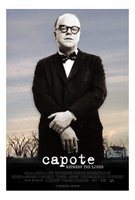
After work today I went to the movies and saw Capote.
There are a handful of books I've picked up over the years and not finished, two of them are In Cold Blood by Truman Capote and The Great Gatsby by F. Scott Fitzgerald. Of course, both of those were years ago - these days I seem to finish every book no matter how hard-going it is (the best example of this would be the gigantic space opera I read late last year).
But this is only a very round about way to admit that I hadn't read the book before I went and saw the movie. And anyway, the movie is not a movie of the book, but a movie about Truman Capote and his experience of writing the book.
Capote was already a famous and successful writer when the movie begins in the late '50s, his most renowned book being Breakfast At Tiffany's. Then he reads a newspaper item about the shotgun murder of a family on a Kansas farm, and at the time he was writing for the New Yorker, so he went out there to do a piece on it. But when he met one of the two murderers, Perry Smith, he became obsessed with him, and decided to expand the magazine article to novel-length, and this became the first non-fiction novel.
Phillip Seymour-Hoffman plays Capote and he is excellent. Capote must have had a very unusual voice, because throughout the movie Hoffman speaks like a baby. You can see that people don't know what to make of him and his strange baby-voice. But as he says at one point in the movie, all his life he has had to deal with people who judged him by the way he spoke.
The murderer Perry Smith is played by Clifton Collins Jr, an excellent performance. His character shows no emotion at all, only a vague sense of confusion as to what he is doing there in prison, and no doubt in the world itself. There's never any doubt that he did it, and he never claims otherwise.
The essence of the movie is the nature of the relationship between Smith and Capote. Even though at times they call it a friendship, it's really not, although Capote does get a better lawyer to launch an appeal against the death sentence, but his main focus is always the book he is writing. It's about the exploitational nature of the writer and his subject. Does he actually care about this guy sentenced to death? Near the end, Capote is seen in a club getting drunk and complaining that 'they' are torturing him with these stays of execution, which is delaying his finishing the book.
Also noteworthy is Catherine Keener playing Harper Lee, a close friend of Capote and his research assistant, who at that time was writing To Kill A Mockingbird. There was an amusing scene where a bunch of male writers are asking her about her book, saying things like, "Oh, how's that book of yours going? What's it called? Killing a Bird?" She says, "Yeah, that's close enough." Even Capote himself seems so wrapped up in his own problems to care about his friend getting published.
Anyway, it was a very good movie and I enjoyed it.
There were a lot of people in the theatre and many of them had noisy food packets that they seemed to squeeze and rattle the most during the quieter moments of the movie. Why can't they wait until a noisy part of the movie, I wonder? Is it because they are thoughtless swine who just can't wait to shove the next greasy mouthful into their slavering gobs? I can arrive at no other conclusion. *OINK! OINK!*

2 comments:
With regards to Truman Capote's voice, for many years he was a fixture on various talk shows in the United States, such as Dick Cavett, Johnny Carson, and others, so I heard him speak a number of times. Philip Seymour Hoffman got his voice pretty much exactly right.
Wow, so he really dig speak like that.
Thanks very much for the comment.
Post a Comment